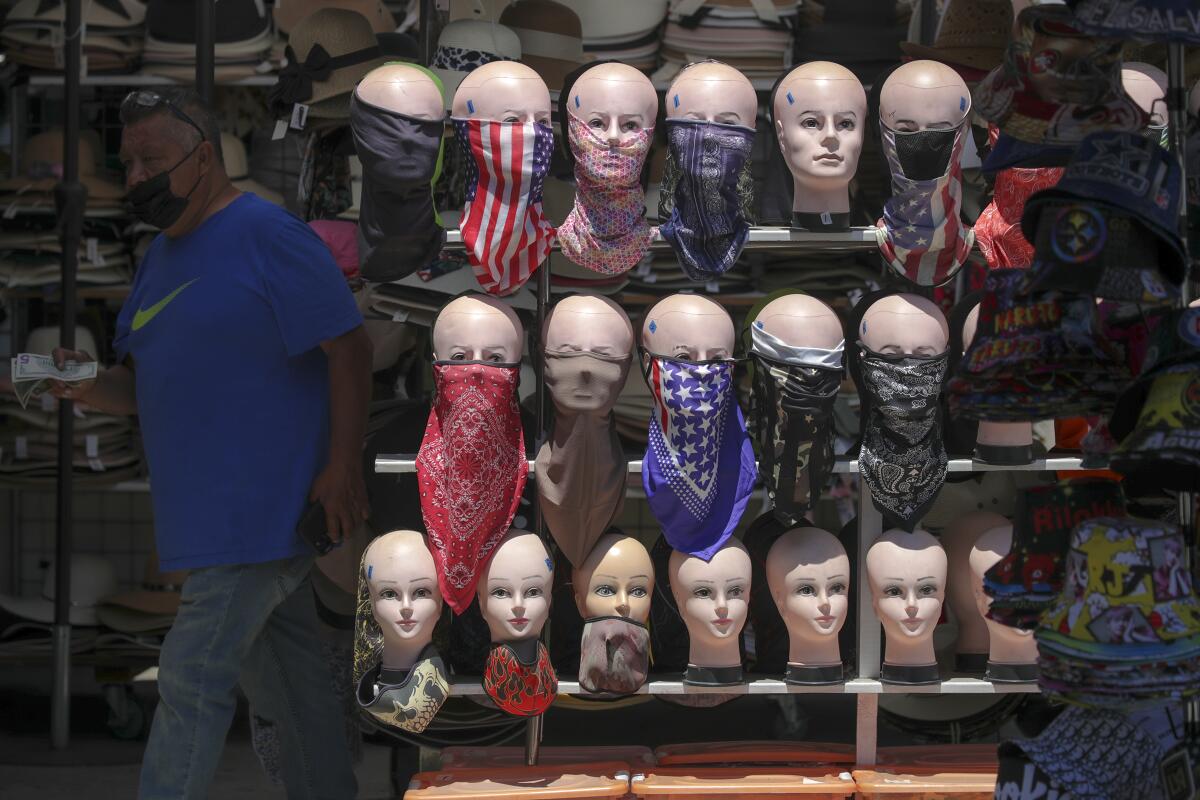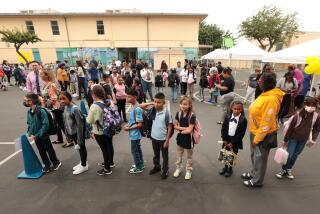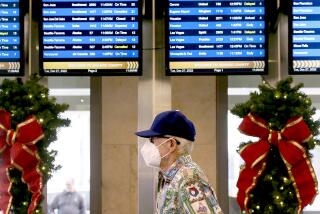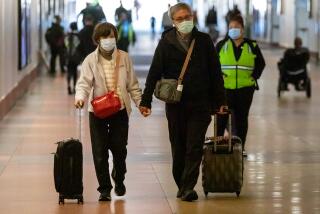Coronavirus cases soar at L.A. County workplaces, complicating back-to-office push

- Share via
Workplaces throughout Los Angeles County are being hit hard by the latest coronavirus wave, with the number of reported case clusters nearly quadrupling since early May.
The sharp rise is the latest wrinkle for the halting efforts by companies looking to bring employees back on something resembling a pre-pandemic schedule.
Among the areas to see infection clusters: airports, food processing companies, aerospace and Hollywood film and television production. This comes as hospitalizations and deaths in L.A. County are rising due to the spread of ultra-infectious subvariants.
Patterns of office attendance and leasing have changed over the past two years in line with the COVID-19 threat level, real estate industry observers report. When surges subside, employers are more likely to sign new space commitments with landlords and to press workers to come to the office.
Given the extent of workplace case clusters, county health officials are recommending that employers take steps to reduce crowding and, if there’s a suspected outbreak, expand options for remote work.
Countywide, 371 workplaces reported clusters of coronavirus cases in the week to Tuesday. In early May, the number was 100.
A cluster is defined as three or more coronavirus cases within a 14-day period. Workplaces are required to report clusters to the L.A. County Department of Public Health. A cluster does not necessarily mean that transmission occurred at the workplace; employees may have become infected elsewhere.
L.A. County officials say if there are more than 300 workplaces reporting clusters in a week, it is cause for a high level of concern.
The “clusters and outbreaks are disruptive and hazardous, particularly as many more outbreaks now involve 20 or more workers,” L.A. County Public Health Director Barbara Ferrer said this week. “Staff need to abruptly take time off to isolate and recover, leading to staffing shortages and interruptions in customary operations. Work-site outbreaks create worrisome risk for vulnerable employees, and they often contribute to additional spread of the virus across households and communities where our workers live.”
Rising and waning COVID-19 surges have bedeviled efforts by many employers to get workers back into the office on a steady basis after their buildings were mostly emptied early in the pandemic. Average office populations have yet to reach half of what they were before the pandemic, and any gains achieved slip back whenever new variants gather strength.
According to Kastle Systems, which provides key-card entry systems used by many companies and tracks patterns of workers’ swipes, the national average office population hit a low of 14.6% in mid-April 2020. Last week, it was at 39.6%, down from nearly 44% at the end of June, as the pandemic surged again and workers observed the July 4 holiday.
Los Angeles was slightly below the national average, at 38.5%, which also reflected a recent dip. White-collar employers in San Francisco appear to be among the most cautious in the country, with office population falling to 30% from nearly 35% at the end of June.
In L.A. County, outbreaks are occurring at work sites with the greatest number of employees, including airports. At the Transportation Security Administration at Los Angeles International Airport, 137 cases were reported among employees. American Airlines at LAX saw 94 cases among its workforce; Southwest Airlines had 38 cases at Hollywood Burbank Airport and 28 at its Terminal 1 facility at LAX.
Also affected are companies associated with food production and retail. They include Smithfield Foods in Vernon, which processes hogs, with 54 cases; Costco in Burbank, with 38; Whole Foods Market in Glendale, with 30; and Lee Kum Kee in Industry, which produces Asian sauces, with 28.
The Apple Store in Manhattan Beach has 27 cases; Ikea in Burbank has 21.
Aerospace companies reported a number of clusters, including Raytheon in El Segundo, with 34 cases; Lisi Aerospace in Torrance, with 31; and the Aerospace Corp. in El Segundo, with 26.
Warner Bros. Studios in Burbank reported 49 cases; the cluster occurred a month after the studio started asking employees to come back to the office for at least three days a week.
Camp JCA Shalom of Sylmar has 29 staff cases and 45 non-staff cases. Other workplaces with 30 or more cases include Starr Surgical of Monrovia, Newegg of Industry, Southland Box Co. of Vernon, Progressive Gaming of Hawaiian Gardens and VCA Animal Specialty & Emergency Center on the Westside of Los Angeles.
An agreement between Hollywood studios and a group of entertainment industry unions is set to be extended until the end of September.
Also of high concern to county health officials is the number of outbreaks occurring at nursing homes.
Investigations were underway at 41 nursing homes in the past week, five times more than in early May. Many involve 15 or more cases at a single facility, officials said.
“A recent worrisome finding is that we’re now seeing an increased percentage of our overall deaths associated with skilled nursing facility outbreaks,” Ferrer said. “Back in May, about 5% of all deaths occurred among nursing home residents. Sadly, this number rose to 12% in June.”
A greater proportion of COVID-19 deaths are now occurring among people age 80 and older. In May, that age group accounted for 44% of deaths; a month later, it was 58%.
“Surging cases in the community are creating an increased risk for the most vulnerable, who can least afford to get infected,” Ferrer said. “We’re now recording the highest number of new outbreaks in skilled nursing facilities since January of this year.”
Overall, L.A. County is averaging about 100 COVID-19 deaths a week, double the rate of a month ago. During the peak of last winter’s Omicron surge, the county had more than 500 deaths per week.
Transmission remains elevated. L.A. County is reporting an average of 6,800 coronavirus cases a day — the most since February and a 35% increase from last week. The latest rate is equivalent to 469 weekly cases per 100,000 residents; a rate of 100 or greater is considered high.
The daily case rate is nowhere near as high as that recorded during the Omicron surge, which saw a peak of 42,000, but has surpassed the peak of last summer’s Delta surge, which was 3,500.
However, the official case tally is a significant undercount, given the wide availability of at-home tests, the results of which are not reliably reported. Among test results that are reported, L.A. County is reporting a positivity rate of 17% — more than double the rate from this time last month.
“Many healthcare providers in the community are telling us that they’re seeing closer to a 40% test positivity rate among their patients coming in for care,” Ferrer said.
There were about 1,223 people with coronavirus infections in L.A. County hospitals as of Thursday, twice as many as a month earlier and the most since February.
For the record:
5:30 a.m. July 19, 2022An earlier version of this article indicated that Los Angeles County on Thursday was reporting 10.5 weekly coronavirus-positive hospital admissions. It was reporting 10.5 new weekly coronavirus-positive hospital admissions for every 100,000 residents.
The rate of coronavirus-positive hospital admissions climbed 25% in a single week. On Thursday, the Department of Public Health said L.A. County was reporting 10.5 weekly coronavirus-positive admissions for every 100,000 residents, up from 8.4 the prior week.
Thursday was the first time since February that weekly hospital admissions exceeded 10 for every 100,000 residents, which places the county in the high COVID-19 community level as defined by the U.S. Centers for Disease Control and Prevention.
Roughly 42% of coronavirus-positive patients in L.A. County are being treated for COVID-19 illness; the remainder are hospitalized for other reasons. Nonetheless, patients infected with the coronavirus represent a potential strain on the healthcare system, due to greater resources needed to isolate them.
“Although many of those hospitalized are not there because of COVID illness, the rising numbers do indicate that for significant numbers of people, COVID remains a very dangerous virus,” Ferrer said.
Additionally, the percentage of weekly emergency room visits related to coronavirus-related issues has doubled from 5% in mid-May to 10% now.
“This signals that COVID is placing increasing pressure on our medical systems as viral transmission increases and there are many more infected people that are sick enough to seek emergency medical care,” Ferrer said.
Times staff writer Anousha Sakoui contributed to this report.
More to Read
Sign up for Essential California
The most important California stories and recommendations in your inbox every morning.
You may occasionally receive promotional content from the Los Angeles Times.

















